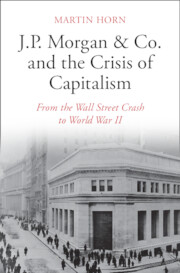7 results
11 - The Little Fellow and the Great Depression
-
- Book:
- Citizen Cowboy
- Published online:
- 16 August 2024
- Print publication:
- 29 August 2024, pp 284-316
-
- Chapter
- Export citation
Epilogue Chief Justice Taft Exits the Scene
- from Part VIII - Labor, Equal Protection, and Race
-
- Book:
- The Taft Court
- Published online:
- 19 October 2023
- Print publication:
- 09 November 2023, pp 1494-1518
-
- Chapter
- Export citation
8 - Maneuver
- from Part I - Enemies
-
- Book:
- This Is Not Who We Are
- Published online:
- 19 January 2023
- Print publication:
- 19 January 2023, pp 115-127
-
- Chapter
- Export citation
Introduction
-
- Book:
- J.P. Morgan & Co. and the Crisis of Capitalism
- Published online:
- 17 February 2022
- Print publication:
- 03 March 2022, pp 1-11
-
- Chapter
- Export citation
5 - “Witchcraft”: J.P. Morgan & Co., Hoover, and the Depression in the United States, 1930–1933
-
- Book:
- J.P. Morgan & Co. and the Crisis of Capitalism
- Published online:
- 17 February 2022
- Print publication:
- 03 March 2022, pp 154-206
-
- Chapter
- Export citation

J.P. Morgan & Co. and the Crisis of Capitalism
- From the Wall Street Crash to World War II
-
- Published online:
- 17 February 2022
- Print publication:
- 03 March 2022
7 - The Vast Wasteland
-
- Book:
- The Mind of the Censor and the Eye of the Beholder
- Published online:
- 07 October 2021
- Print publication:
- 04 November 2021, pp 158-192
-
- Chapter
- Export citation

